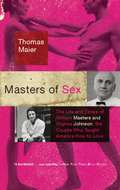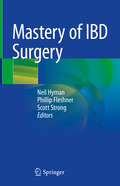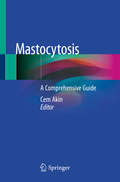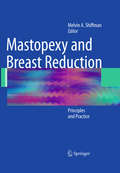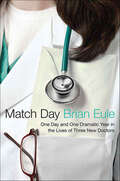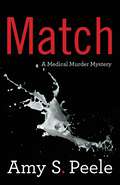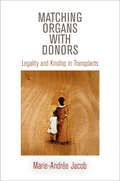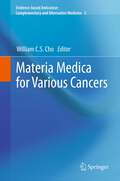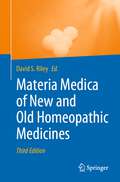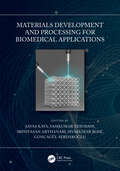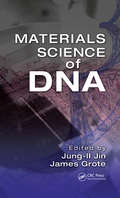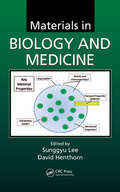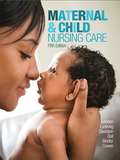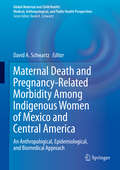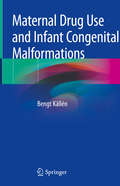- Table View
- List View
Masters of Sex
by Thomas MaierIn Masters of Sex, critically acclaimed biographer Thomas Maier offers an unprecedented look at William Masters and Virginia Johnson, their pioneering studies of intimacy, and the sexual revolution they inspired. Masters and Johnson began their secret studies in a small Midwest laboratory, and soon became the nation’s top experts on sex. Over the course of more than forty years, they analyzed and explained the secrets of orgasm, emotional fulfillment, and sexual dysfunction. But they divorced after twenty years amid a clash of success, betrayal, and jealousies. Weaving interviews with the notoriously private William Masters and the ambitious Virginia Johnson, Maier offers a titillating portrait of the legendary couple. Entertaining, revealing, and beautifully told, this groundbreaking book sheds light on the eternal mysteries of desire and intimacy, and their complicated roles in the American psyche.
Mastery of IBD Surgery
by Neil Hyman Phillip Fleshner Scott StrongThis book provides a guide to the management of patients with Crohn’s disease and ulcerative colitis. The indications for surgery within inflammatory bowel disease are covered, as well as new biologic medications and the effects they have on the immune system. Details on how these drugs should be managed to avoid complications and ensure patient safety are also included. Mastery of IBD Surgery sets out to cover surgical responses to inflammatory bowel disease from a multidisciplinary perspective and aims to help all surgeons and medical professionals working in this area. This book is relevant to colorectal surgeons, gastrointestinal surgeons, and gastroenterologists.
Mastitis Control in Dairy Herds
by Peter Edmondson Roger BloweyMastitis in dairy herds is a worldwide problem, with significant implications for milk yields and quality, economic losses, and animal health and welfare. Effective control makes a considerable difference to the farmer and the animal, and this new edition includes updated information throughout as well as new chapters covering organic dairy herds, dry period infections, robotic milking, residue avoidance, and best practice procedures. The authors, both fellows of the Royal College of Veterinary Surgeons and recognised experts in the field, provide basic principles relevant to farmers, vets and veterinary students in a clear and practical way, covering anatomy, epidemiology, milking machines, disinfection, somatic cell counts, and diseases of the udders and teats in order to provide a thorough understanding of the causes of mastitis and measures of control and prevention. It is an indispensable resource for large animal vets, dairy industry personnel, farm managers, dairy herdsmen, and researchers and students in animal sciences and related disciplines.
Mastocytosis: A Comprehensive Guide
by Cem AkinThis unique book offers an in-depth, best-practices guide to diagnosis and management of mastocytosis, a too-often underdiagnosed disease.Mastocytosis: A Comprehensive Guide will open with a general overview and discussion of mast cell biology, addressing tryptase and other diagnostic markers in detail. Comprehensive diagnostic criteria and classification will follow, with special emphasis on commonly-seen related manifestations: skin disease, pediatric mastocytosis, gastrointestinal indicators, osteoporosis, anaphylaxis, venom and drug allergy, and pregnancy. Mastocytosis will be an ideal resource for not only the allergist confronted with this condition, but for a growing, multi-disciplinary audience of hematologists, gastroenterologists, dermatologists, pediatricians, primary care providers and other clinicians who encounter this disease in their patients.
Mastopexy and Breast Reduction
by Melvin A. ShiffmanThis comprehensive guide covers all aspects of mastopexy and breast reduction, ranging from anatomy to the variety of procedures in mastopexy, mastopexy/breast reduction, and breast reduction, preoperative care, complications, breast tumors (benign and malignant), and medicolegal aspects.
Match Day: One Day and One Dramatic Year in the Lives of Three New Doctors
by Brian EuleThree new doctors—all women—struggle to balance professional ambitions and personal relationships, triumphs and crises, uncertainties and decisions, through one pressure-packed day and the first year of their careers in medicine Each year, on the third Thursday in March, more than 15,000 graduating medical students exult, despair, and endure Match Day: the decision of a controversial computer algorithm, which matches students with hospital residencies in every field of medicine. The match determines where each graduate will be assigned the crucial first job as an intern, and shapes the rest of his—or, in increasing number, her—life. In Match Day, Brian Eule follows three women from the anxious months before the match through the completion of their first year of internship. Each woman makes mistakes, saves lives, and witnesses death; each must keep or jettison the man in her life; each comes to learn what it means to heal, to comfort, to lose, and to grieve, while maintaining a professional demeanor. Just as One L became the essential book about the education of young attorneys, so Match Day will be for every medical student, doctor, and reader interested in medicine: a guide to what to expect, and a dramatic recollection of a pressured, perilous, challenging, and rewarding time of life.
Match: A Medical Murder Mystery
by Amy S. PeeleWhat do politics, living donor kidney transplants, and the current opioid crisis all have in common? Sarah Golden and Jackie Larsen, best friends since nursing school, could never have imagined that they’d end up as amateur sleuths searching to find a killer—for the second time! Jackie, a stay-at-home mom with marriage troubles, is racing the clock to get her young son, Wyatt, a living kidney donor to avoid the ravages of dialysis. Sarah, who has been living her career in the fast-paced world of organ transplantation, is helping expedite Wyatt’s kidney transplant. Then a much-despised hospital colleague turns up dead of an opiate overdose—despite the fact that she’d never used drugs—and Sarah smells foul play. Her curiosity and tenacity pull Jackie, once again, into a life-and-death adventure that neither woman could have expected. Armed with smarts, tenacity, big hearts, and their raucous senses of humor, the pair gets the help of a few colorful friends to pursue the killer and take on the mission in the only style they both know how: straight on and arm-in-arm as the friends they’ve always been.
Matching Organs with Donors
by Marie-Andree JacobWhile the traffic in human organs stirs outrage and condemnation, donations of such material are perceived as highly ethical. In reality, the line between illicit trafficking and admirable donation is not so sharply drawn. Those entangled in the legal, social, and commercial dimensions of transplanting organs must reconcile motives, bureaucracy, and medical desperation. Matching Organs with Donors: Legality and Kinship in Transplants examines the tensions between law and practice in the world of organ transplants--and the inventive routes patients may take around the law while going through legal processes.In this sensitive ethnography, Marie-Andrée Jacob reveals the methods and mindsets of doctors, administrators, gray-sector workers, patients, donors, and sellers in Israel's living kidney transplant bureaus. Matching Organs with Donors describes how suitable matches are identified between donor and recipient using terms borrowed from definitions of kinship. Jacob presents a subtle portrait of the shifting relationships between organ donors/sellers, patients, their brokers, and hospital officials who often accept questionably obtained organs.Jacob's incisive look at the cultural landscapes of transplantation in Israel has wider implications. Matching Organs with Donors deepens our understanding of the law and management of informed consent, decision-making among hospital professionals, and the shadowy borders between altruism and commerce.
Materia Medica for Various Cancers
by William C.S. ChoCancer is one of the leading killers in the world and the incidence is increasing, but most cancer patients and cancer survivors suffer much from the disease and its conventional treatments' side effects. In the past, clinical data showed that some complementary and alternative medicine (CAM) possessed anticancer abilities, but some clinicians and scientists have queried about the scientific validity of CAM due to the lack of scientific evidence. There is great demand in the knowledge gap to explore the scientific and evidence-based knowledge of CAM in the anticancer field. With this aim, a book series is needed to structurally deliver the knowledge to readers. There have been a number of publications on materia medica for various cancers in recent years, the scientific and medical community are thrust for up-to-date information that are supported by concrete laboratory evidences or clinical trials. This volume is a specialised book presenting the experimental and clinical evidences of anticancer materia medica for various cancers. This book consists of sixteen chapters, providing concise reviews and expert opinions on the recent progress of materia medica research in fourteen particular cancers from bench to bedside application. In addition, the book also includes a chapter with an overview of evidence-based materia medica for cancer chemoprevention, as well as a chapter discussing on the pharmacokinetics of anticancer materia medica. Gathering international opinion leaders' views, this volume will contribute great to the cancer, academic, and clinical community by providing evidence-based information on the anticancer effects of materia medica for various cancers. Readership Oncologists, cancer researchers, pharmacologists, pharmaceutical specialists, Chinese medicine practitioners, medical educators, postgraduates and advanced undergraduates in biomedical disciplines, cancer caregivers, cancer patients.
Materia Medica of New and Old Homeopathic Medicines
by David S. RileyDavid S. Riley’s interest in the research and subsequently the history and methodology of homeopathic drug provings began with his medical school training in 1979 and a residency in Internal Medicine. He was exposed to homeopathy in 1988 followed by study at the Hahnemann College of Homeopathy in Albany, California. He has investigated the interplay between contemporary research methods and the research methods associated with homeopathic drug provings. Dr Riley has developed research tools for data collection, symptom selection criteria and blinding; primarily to address the risk of bias.The homeopathic drug provings published here are the result of this work. For the 3rd edition twelve homeopathic drug provings, conducted by a number of internationally renowned proving directors, have been added. These homeopathic drug provings all follow good clinical practice (GCP) research guidelines and incorporate the guidelines suggested by Dr Samuel Hahnemann more than 200 years ago.
Materials Development and Processing for Biomedical Applications
by Savaş Kaya Sasikumar Yesudass Srinivasan Arthanari Sivakumar Bose Goncagül SerdaroğluMaterials Development and Processing for Biomedical Applications focuses on various methods of manufacturing, surface modifications, and advancements in biomedical applications. This book examines in detail about five different aspects including, materials properties, development, processing, surface coatings, future perspectives and fabrication of advanced biomedical devices. Fundamental aspects are discussed to better understand the processing of various biomedical materials such as metals, ceramics, polymers, composites, etc. A wide range of surface treatments are covered in this book that will be helpful for the readers to understand the importance of surface treatments and their future perspectives. Additional Features Include: Examines various properties of biomedical materials at the beginning in several chapters which will enrich the fundamental knowledge of the readers. Discusses advancements in various fields of biomedical applications. Provides a glimpse of characterization techniques for the evaluation of material properties. Addresses biocompatibility, biocorrosion, and tribocorrosion. This book explores new and novel strategies for the development of materials and their biomedical applications. It will serve as a comprehensive resource for both students and scientists working in materials and biomedical sciences.
Materials Science of DNA
by James Grote Jung-Ii JinThe field of materials science and technology has undergone revolutionary advances due to the development of novel analytical tools, functional materials, and multidisciplinary approaches to engineering. Additionally, theoretical predictions combined with increasingly improved models and computational capabilities are making impressive contribution
Materials and Electro-mechanical and Biomedical Devices Based on Nanofibers (CISM International Centre for Mechanical Sciences #611)
by Alexander L. Yarin Filippo Pierini Eyal Zussman Marco LauricellaThe book is interwoven according to the intrinsic logics of modern most important applications of electrospun nanofibers. It discusses such application-oriented nanofibers as self-healing vascular nanotextured materials, biopolymer nanofibers, soft robots and actuators based on nanofibers, biopolymer nanofiber-based triboelectric nanogenerators, metallized nanofibers, and heaters and sensors based on them. It also includes such topics as the injectable nanofibrous biomaterials, fibrous hemostatic agents and their interaction with blood, as well as electrospun nanofibers for face-mask applications. The book also details polyelectrolytes-based complex nanofibers and their use as actuators. It also covers drug release facilitated by polyelectrolytes-based complex nanofibers. The fundamental aspects of electrospinning of polymer nanofibers discussed in the final part of the book link them to the applications described in the preceding chapters. Such topics as polymer solution preparation and their rheological properties, e.g., viscoelasticity and the related spinnability, the electrical conductivity of polymer solutions, and the cascade of the physical phenomena resulting in formation of nanofibers encompass the experimental aspects. Also, the general quasi-1D equations used for modeling of formation of electrospun polymer nanofibers, and the numerical aspects of their solution are discussed in detail, including such modeling-driven applications as nanofiber alignment by electric focusing fields.
Materials for Biomedical Simulation: Design, Development and Characterization (Materials Horizons: From Nature to Nanomaterials)
by Gurpreet Singh Sarabjeet Singh Sidhu Arnab ChandaThe book provides an overview of prospective material simulants for hard tissues, such as knee joints, hip joint, and bones, and soft tissues, such as skin, muscles, and functional organs. These materials can repair, replace the functionality, or mimic the mechanical, structural, and biological properties of the parent tissue. This book discusses hard and soft human tissue simulating biomaterials under a single umbrella, covering a broad area of design and development of biomaterials, implants, and multi-functional materials along with their characterization. The progress in emerging biomaterials has increased manifold in the recent decades with the unprecedented focus on healthcare technologies. This book is dedicated to ground-breaking research in biomaterials and highlights the current trends and future roadmap of different materials for simulation of hard and soft tissues. Authored by prominent researchers around the globe, the chapters of this book emphasize recent advances in biomedical material simulation. This book brings together novel contributions to different aspects of hard and soft human tissue-based biomaterials, including recent advances and emerging developments in designing and developing simulants for tissue replacement alternatives. This book is anticipated to serve as a key reference textbook for research in tissue engineering & biomedical engineering, biomaterials, biomechanics, and implant & medical device development with contributed chapters solicited in the areas of soft materials, such as elastomers, hydrogels, etc., for various applications; auxetic metamaterials; additive manufacturing of bio-implants; artificial tissues and organs; development of biomimetic materials; medical implants and biomedical device design; bioinspired and bio-tribological materials; advances in materials science for biomaterial applications; biomechanical characterization of hard and soft human tissues; bioprinting and nano-biomaterials.
Materials in Biology and Medicine (Green Chemistry and Chemical Engineering)
by Sunggyu Lee David HenthornWhile the interdisciplinary field of materials science and engineering is relatively new, remarkable developments in materials have emerged for biological and medical applications, from biocompatible polymers in medical devices to the use of carbon nanotubes as drug delivery vehicles. With peer-reviewed chapters written by a select group of academic and industry experts, this comprehensive yet accessible book covers the most advanced materials used in biology and medicine. The book focuses on biomaterials and bioinspired materials, functional and responsive materials, controlling biology with materials, and the development of devices and enabling technologies. It will help readers tackle challenges of novel materials, carry out new process and product development projects, and create new methodologies for applications that enhance the quality of life.
Materiomics: High-throughput Screening of Biomaterial Properties
by Jan De Boer Clemens A. van BlitterswijkThis complete, yet concise, guide introduces you to the rapidly developing field of high throughput screening of biomaterials: materiomics. Bringing together the key concepts and methodologies used to determine biomaterial properties, you will understand the adaptation and application of materomics in areas such as rapid prototyping, lithography and combinatorial chemistry. Each chapter is written by internationally renowned experts, and includes tutorial paragraphs on topics such as biomaterial-banking, imaging, assay development, translational aspects, and informatics. Case studies of state-of-the-art experiments provide illustrative examples, whilst lists of key publications allow you to easily read up on the most relevant background material. Whether you are a professional scientist in industry, a student, or a researcher, this book is not to be missed if you are interested in the latest developments in biomaterials research.
Maternal & Child Health Nursing: Care of the Childbearing & Childrearing Family
by JoAnne Silbert-FlaggA respected authority updated for today’s changing healthcare environment, Maternal & Child Health Nursing, 9th Edition, equips students for success by presenting maternal-newborn and child healthcare not as two separate disciplines, but as a continuum of knowledge. This extensively revised 9th Edition integrates a nursing process framework, an approachable organization, the latest evidence-based research, and engaging learning aids to ensure a mastery of essential concepts and cultivate the skills for successful nursing practice.
Maternal And Child Nursing Care
by Michele Davidson Jane Ball Marcia London Patricia Ladewig Ruth Bindler Kay CowenDesigned to support faster, more efficient learning in condensed courses, Maternal & Child Nursing Care presents key content about maternal-newborn nursing, women’s health, and pediatric nursing topics in an accurate, readable way. Throughout this family-focused text, special attention is paid to health promotion, home/community care, patient and family education, clinical reasoning, evidence-based practice, and cultural competence. Engaging features help readers learn and retain essential concepts in a short period of time.
Maternal Child Nursing Care
by David Wilson Marilyn Hockenberry Shannon Perry Deitra Lowdermilk Kathryn Alden Mary CashionGet the accurate, practical information you need to succeed in the classroom, the clinical setting, and on the NCLEX-RN® examination. Written by the foremost experts in maternity and pediatric nursing, the user-friendly Maternal Child Nursing Care, 6th Edition provides both instructors and students with just the right amount of maternity and pediatric content. This new edition includes updated case studies within Nursing Care Plans, as well as a new chapter on pediatric cancer. Focus on the family throughout emphasizes the influence of the entire family in health and illness.
Maternal Child Nursing Care
by Deitra Leonard Lowdermilk Shannon E. Perry Kitty Cashion Marilyn J. Hockenberry Kathryn Rhodes Alden Ellen OlshanskyMaster the essentials of maternity and pediatric nursing with this comprehensive, all-in-one text! Maternal Child Nursing Care, 7th Edition covers the issues and concerns of women during their childbearing years and children during their developing years. It uses a family-centered, problem-solving approach to patient care, with guidelines supported by evidence-based practice. New to this edition is an emphasis on clinical judgment skills and a new chapter on children with integumentary dysfunction. Written by a team of experts led by Shannon E. Perry and Marilyn J. Hockenberry, this book provides the accurate information you need to succeed in the classroom, the clinical setting, and on the Next Generation NCLEX-RN® examination.
Maternal Child Nursing Care (4th Edition)
by Deitra Leonard Lowdermilk Shannon E. Perry Marilyn J. Hockenberry David WilsonThis fourth edition of Maternal Child Nursing Care combines essential maternity and pediatric nursing information into one text. The text focuses on the care of women during their reproductive years and the care of children from birth through adolescence. The book provides students with the knowledge and skills they need to become competent critical thinkers and to attain the sensitivity needed to become caring nurses.
Maternal Critical Care
by Marc Van de Velde Helen Scholefield Lauren A. Plante Marc Van de Velde Helen ScholefieldIf you are an obstetrician whose patient has been admitted to ICU, you need to know how she is managed there. If you are an intensivist, you need to adapt to changes in physiology, alter techniques for the pregnant patient and keep the fetus from harm. This book addresses the challenges of managing critically ill obstetric patients by providing a truly multidisciplinary perspective. Almost every chapter is co-authored by both an intensivist/anesthesiologist and an obstetrician/maternal-fetal medicine expert to ensure that the clinical guidance reflects best practice in both specialties. Topics range from the purely medical to the organizational and the sociocultural, and each chapter is enhanced with color images, tables and algorithms. Written and edited by leading experts in anesthesiology, critical care medicine, maternal-fetal medicine, and obstetrics and gynecology, this is an important resource for anyone who deals with critically ill pregnant or postpartum patients.
Maternal Death and Pregnancy-Related Morbidity Among Indigenous Women of Mexico and Central America: An Anthropological, Epidemiological, And Biomedical Approach (Global Maternal and Child Health)
by David A. SchwartzThis ambitious sourcebook surveys both the traditional basis for and the present state of indigenous women’s reproductive health in Mexico and Central America. Noted practitioners, specialists, and researchers take an interdisciplinary approach to analyze the multiple barriers for access and care to indigenous women that had been complicated by longstanding gender inequities, poverty, stigmatization, lack of education, war, obstetrical violence, and differences in language and customs, all of which contribute to unnecessary maternal morbidity and mortality. Emphasis is placed on indigenous cultures and folkways—from traditional midwives and birth attendants to indigenous botanical medication and traditional healing and spiritual practices—and how they may effectively coexist with modern biomedical care. Throughout these chapters, the main theme is clear: the rights of indigenous women to culturally respective reproductive health care and a successful pregnancy leading to the birth of healthy children.A sampling of the topics: Motherhood and modernization in a Yucatec village Maternal morbidity and mortality in Honduran Miskito communities Solitary birth and maternal mortality among the Rarámuri of Northern Mexico Maternal morbidity and mortality in the rural Trifino region of Guatemala The traditional Ngäbe-Buglé midwives of Panama Characterizations of maternal death among Mayan women in Yucatan, Mexico Unintended pregnancy, unsafe abortion, and unmet need in GuatemalaMaternal Death and Pregnancy-Related Morbidity Among Indigenous Women of Mexico and Central America is designed for anthropologists and other social scientists, physicians, nurses and midwives, public health specialists, epidemiologists, global health workers, international aid organizations and NGOs, governmental agencies, administrators, policy-makers, and others involved in the planning and implementation of maternal and reproductive health care of indigenous women in Mexico and Central America, and possibly other geographical areas.
Maternal Drug Use and Infant Congenital Malformations
by Bengt KällénThis book is the combination of the literature on maternal drug use and birth defects with a set of new data on most types of drugs. In this book, for each group of drugs the relevant scientific literature on drug teratogenicity is presented, with consideration of possible sources of error and also what the findings may mean from a practical point of view. The book also adds data from the Swedish health registers for 1996-2013 based on more than 1.7 million early-pregnancy midwife interviews. Maternal Drug Use and Infant Congenital Malformations will find an engaged audience among people working within the field, and will be of interest to healthcare providers, especially obstetricians and other clinicians who treat women of childbearing age.
Maternal Fetal Transmission of Human Viruses and their Influence on Tumorigenesis
by György Berencsi IIIThe human foetus is separated from the maternal blood by the syncytiotrophoblast induced by endogeneous human retrovirus-encoded proteins. This barrier is a highly developed one, which suppors apical-basolateral transport of maternal idiotype and anti-idiotype IgG, IgG-virus complexes. The selective maternal-fetal transport of epitope- and paratope-bearing entities can influence the developping fetal immune system during pregnancy. The bidirectional maternal-fetal transfer of cells are of even more importance during pregnancy. Maternal cells with latent viruses transport viruses without impairment of fetal development. Cells with premaligant and malignant genetic transformation are also transported to the fetus. Fetal and neonatal tumours are initiated by such cells in spite of the antitumour potential of fetal organism. On the contary, the fetal cells repair maternal tissue injouries and survive in the organisms of the recipients for decades. These possess new consequences for the neonatal immunity and organ transplatation surgery.
